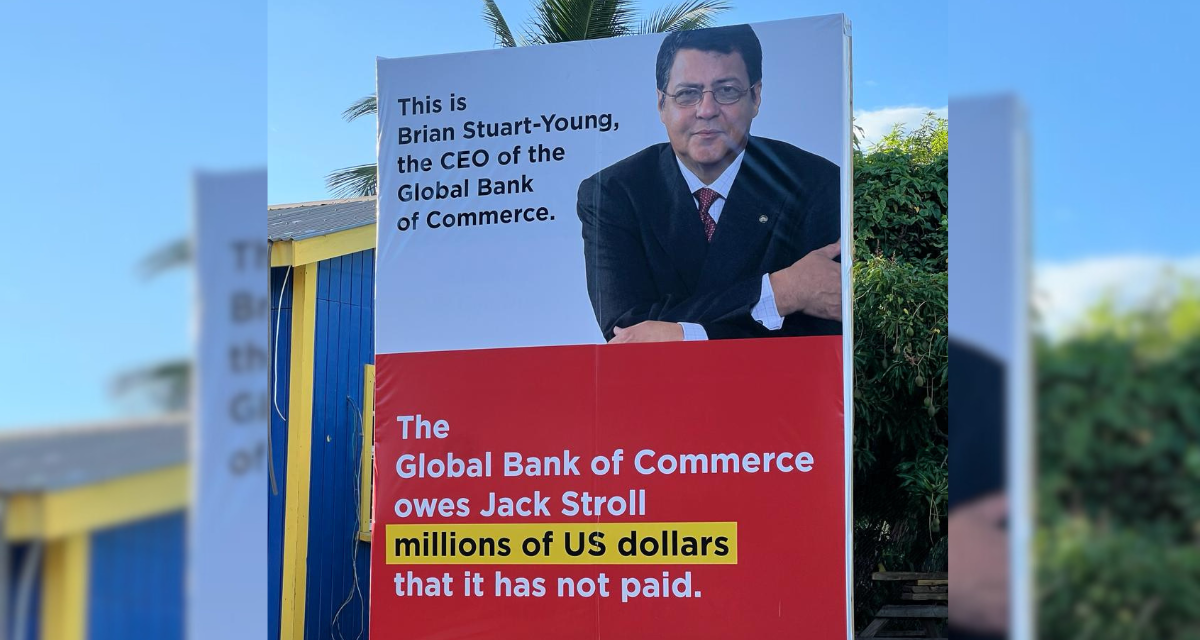The David and Goliath saga of businessman and Antiguan citizen Jack Stroll’s battle for his own money against the Global Bank of Commerce (GBC) has taken an unexpected turn in the last week, sparking concerns of freedom of expression and common justice.
Among the volley of allegations and legal non-compliance, Antigua’s Prime Minister Gaston Browne has staunchly defended GBC’s CEO Brian Stuart-Young’s character, vehemently rebuffing claims of wrongdoing. “Brian Stuart-Young is not a crook. Brian Stewart-Young is a decent man,” Browne avows.
Using this direct quote from the prime minister, a poster appeared on a billboard at Whenner Road, outside the office of the United Progressive Party, with a picture of Stuart-Young, further asking “why won’t Stuart-Young pay Jack Stroll the millions of US dollars he owes him?”
With cries of “defamatory” and “breach of planning control,” the poster was hastily removed by the Development Control Authority (DCA) with “zero notice,” itself a contravention of Antigua’s laws. Despite the “breach of planning control,” the board itself has not been removed, simply the poster. This event has generated nearly as much concern as the entire situation, raising unsettling questions about freedom of expression and potential political misuse by the DCA. A query aired on national radio pondered, “What freedom will we lose next?”
Less than a week later, another poster appeared; what will the DCA do? A quickly published newspaper article calls it “A Symbol of Freedom of Expression and Anti-Corruption Advocacy.” This is where people’s thoughts have turned.
Adding to the outrage is the leniency extended to Stuart-Young, again and again, who has deftly sidestepped crucial inquiries lingering for over two years.
A recent development granting him an extension, despite yet another court ruling, further exacerbates the frustration felt by Stroll and those closely following the saga. Where are the answers to the questions posed by Stroll’s legal team under clause 44.7 – cited by Stuart-Young’s own legal team in what legal pundits describe as a blatant ploy to evade verbal testimony in court?
Stuart-Young had until 4.00 pm on March 15th to respond to these 104 questions, under threat of imprisonment for non-compliance. He failed. Is he incarcerated? No, he was granted another week. And a week later, he was granted another! Questions are being asked about the justice system, as well as the banking system. Jack Stroll’s reaction? “All I want is my money!”
Browne accuses Stroll of reneging on an agreement not to imperil the bank. An accusation that baffles Stroll; “why would I ever agree not to retrieve my money? Of course I wouldn’t!” The crux of the matter lies not in Stroll’s actions, but in the unsettling circumstances surrounding Antigua’s financial regulatory framework, despite the undeniable debt owed to Stroll.
After earlier statements of confidence in the bank, prime minister Browne has now said that CIP funds are no longer deposited in GBC “after it became apparent that the bank was encountering financial difficulties.” This, he stated “ was a necessary step to safeguard the funds and ensure that they are managed in a manner that is in the best interest of the citizens.”
Amidst the mounting scrutiny, the convoluted web of financial entanglements grows ever more perplexing; questions asked, dates earmarked for the repayment of substantial sums to investors, are ignored, propelling the matter into the halls of justice. As Stroll’s fight rages on, it transcends mere personal justice; it symbolises a quest for institutional accountability and the preservation of Antigua’s financial integrity. This is not a battle for money, it is a battle for transparency, rights, justice, even freedom of expression and the integrity of the nation’s banking system. The outcome of this titanic struggle will reverberate far beyond the confines of a courtroom, challenging the principles of banking regulation in the Caribbean nation.

